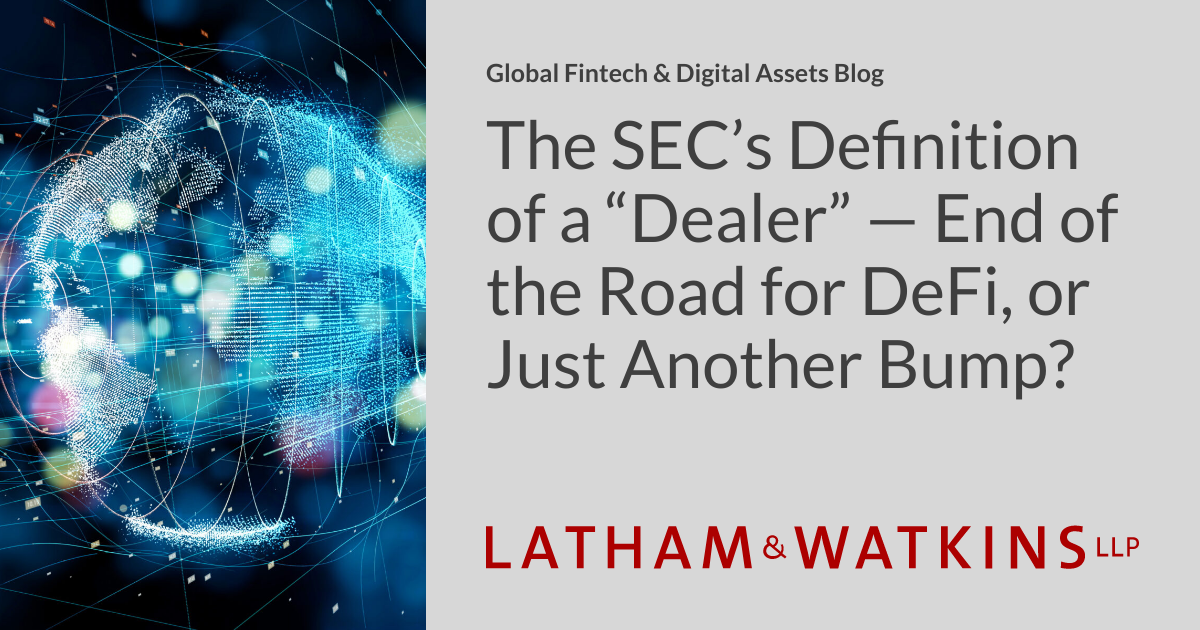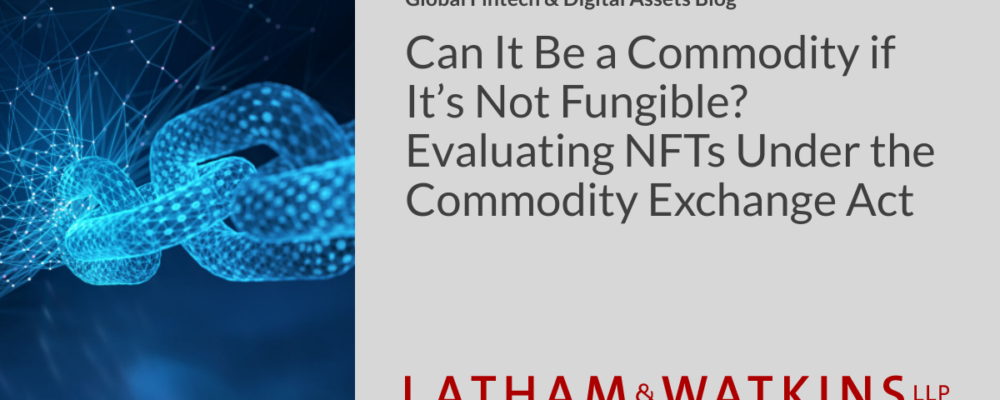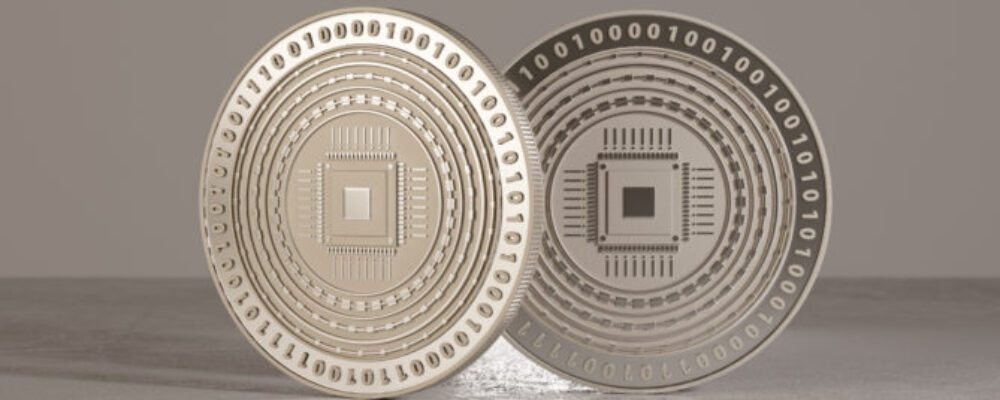The SEC’s ambiguous rule could have a chilling effect both on decentralized finance and on the provision of liquidity to centralized crypto exchanges.
By Jenny Cieplak, Marlon Q. Paz, Stephen P. Wink, and Naim Culhaci
The Securities and Exchange Commission (SEC) adopted a new rule on February 6, 2024, further defining the phrase “as part of a regular business” — which is an integral part of what it means to be a “dealer” under securities laws.
The Securities Exchange Act of 1934 (Exchange Act) defines a dealer as “any person engaged in the business of buying and selling securities … for such person’s own account…” However, it excludes persons buying and selling securities for their own accounts but “not as part of a regular business” (known as the “trader exception”). Hedge funds and proprietary trading funds (PTFs) have traditionally relied on this exception.
“Dealers” are required to register not only with the SEC but also with a self-regulatory organization, like FINRA. Dealers must also comply with myriad rules related to their business, including, for example, recordkeeping, anti-money laundering, and net capital requirements.
DeFi Concerns
Participants in the decentralized finance (DeFi) marketplace have raised concerns regarding the new rules,[1] which narrow the trader exception. In fact, in its adopting release the SEC states that it will review the Staff’s prior no-action letters on the subject and determine which are no longer valid. (See this Latham blog post for more on the adopting release.) The new rule states that any person meeting either of the following criteria is viewed as dealing in securities as part of a regular business (subject to an exemption for persons with less than $50 million in assets), and thus is required to register as a dealer:
- “Regularly expressing trading interest that is at or near the best available prices on both sides of the market for the same security and that is communicated and represented in a way that makes it accessible to other market participants; or
- Earning revenue primarily from capturing bid-ask spreads, by buying at the bid and selling at the offer, or from capturing any incentives offered by trading venues to liquidity-supplying trading interest.”
The SEC declined to identify DeFi market participants that would fall into (or out of) one of these categories, noting instead that certain persons engaging in cryptoasset securities transactions may be operating as dealers. It provided a reference to the SEC v. Beaxy Digital, Ltd. district court case, in which the court ruled in favor of the SEC by enjoining a digital asset platform from, among other things, acting as an unregistered dealer. In any event, the SEC clarified that each market participant must separately evaluate its status based on all the facts and circumstances.[2] Several commenters have noted that this definition could cover participation in or providing automated market-maker protocols, on which the DeFi ecosystem greatly relies. However, a number of additional factors mitigate this risk.
Importantly, the definition of “dealer” requires transactions in “securities.” Recent litigation has shown that whether the majority of digital assets constitute securities is still subject to significant debate.[3] While many commentators noted the need for clarification on this point in their comment letters to the initial proposal, the SEC unsurprisingly continued to decline to provide clarity in this context. Thus, the threshold issue remains whether digital assets traded in DeFi protocols are securities. Even when transactions involve digital assets that are securities, the new rules will capture only certain DeFi participants.
Small Entity Threshold
The new definition excludes persons who have or control assets of less than $50 million. The majority of DeFi users are likely to fall into this category, which is especially important given DeFi’s role of removing gatekeepers and democratizing financial markets. The rule does not automatically aggregate assets across affiliated entities, although it contains an anti-evasion provision which prohibits disaggregation of accounts or otherwise engaging indirectly in activities that would otherwise fall into the definition.
However, the SEC notes that even those persons who fall within this exclusion could be “dealers.”
Regularly Expressing Trading Interest
The first prong of the definition requires that the potential dealer “express trading interest” on both sides of the market for the same security. At first blush this may seem to apply to persons who deposit digital assets with automated market-maker (AMM) protocols, but a closer reading, together with the adopting release, arguably brings this into doubt.
Specifically, the prong requires the trading interest to be “represented in a way that makes it accessible to other market participants.” The SEC explained this language as having the plain meaning that a person “express trading interests to more than one market participant.” A person who merely deposits tokens into an AMM protocol and earns passive income in relation thereto is arguably not itself expressing a trading interest to market participants; rather, if anyone is expressing such interest it would be the AMM protocol itself that is doing so. Of course, the SEC could take the view that the AMM protocol itself and the persons who have established it could be engaged in regulated activity on their own. Although the SEC does not discuss this point, we have seen it seek to broaden the application of its rules to capture persons who “make available” technology protocols, as discussed in our separate blog post. Accordingly, it may be possible for the SEC to look beyond the decentralized nature of DeFi protocols to the persons it believes exercise ultimate control over the organizational, financial, and operational aspects of the protocol in analyzing whether there is “dealer” activity.
In adopting the new rule, the SEC seems to be attempting to level the playing field between registered dealers and trading firms that “have established themselves as significant market intermediaries — and critical sources of liquidity — in a market by employing automated, algorithmic trading strategies that rely on high frequency trading strategies to generate a large volume of orders and transactions would be captured by the expressing trading interest factor.” The SEC appears to be particularly concerned with the markets for US Treasury securities, noting that “proprietary trading firms accounted for 61% of the volume on automated interdealer broker platforms and 48% of the interdealer broker volume overall.” Much ink has been spilled recently over potential risks to the Treasury markets due to a combination of arbitrage and leverage known as the “basis trade,” and the adoption of this new definition may be geared towards reducing market risks associated with outsized leverage.
In comparison, while digital assets deposited in AMM protocols may be borrowed, there is no possibility that the protocol will be unable to deliver on trades as digital assets actually have to be deposited with the protocol in order to be counted toward the protocol’s functioning. Accordingly, while the concerns the SEC sought to address in the traditional securities markets seem fairly clear, whether the same concerns exist in the DeFi context is subject to considerable question. AMM pools, despite the ill-advised name, are designed only to trade the assets that have been deposited with the pool and are unable to increase liquidity in times of need. And persons who deposit digital assets in AMM pools are not necessarily indicating a willingness to provide additional liquidity to the markets.
Primary Revenue Threshold
The second prong of the definition refers to persons that earn revenue “primarily from capturing bid-ask spreads, by buying at the bid and selling at the offer, or from capturing any incentives offered by trading venues to liquidity-supplying trading interest.” The SEC clarified in the adopting release that “primarily” would most likely be interpreted as a majority of a person’s revenues. Thus, the persons who are likely to fall into this category are those who are especially active in the markets for digital asset securities, both DeFi and on centralized exchanges, and that have little other revenue.
Not the End, Still Just the Beginning
If this is not the end of DeFi, what are the next stops in the road? In spite of the rule’s ambiguities, it could have a chilling effect on DeFi — but it is more likely to have a chilling effect on provision of liquidity to centralized exchanges, in which persons engaged in the activity that the new definition covers will be easier to identify. In the end the new definition may have the unintended effect of pushing more market activity to DeFi, in which actors can operate in the comfort of pseudonymity and ambiguity in the rules.
Finally, the threshold issue affecting the SEC’s jurisdiction over the digital asset sector of course remains whether the digital assets that are being traded on DeFi platforms and elsewhere are securities. The law on this issue is still being decided through litigation, and to the extent that digital assets are securities, a wide array of securities regulatory issues will arguably affect market participants beyond a potential dealer registration requirement, including registration of securities transactions and broker-dealer registration more generally.
Latham & Watkins
Please visit the firm link to site





